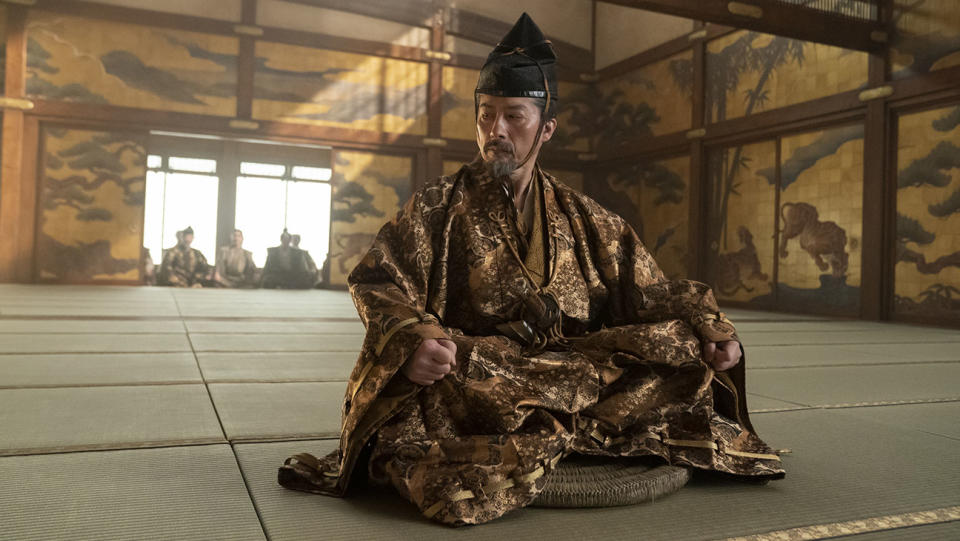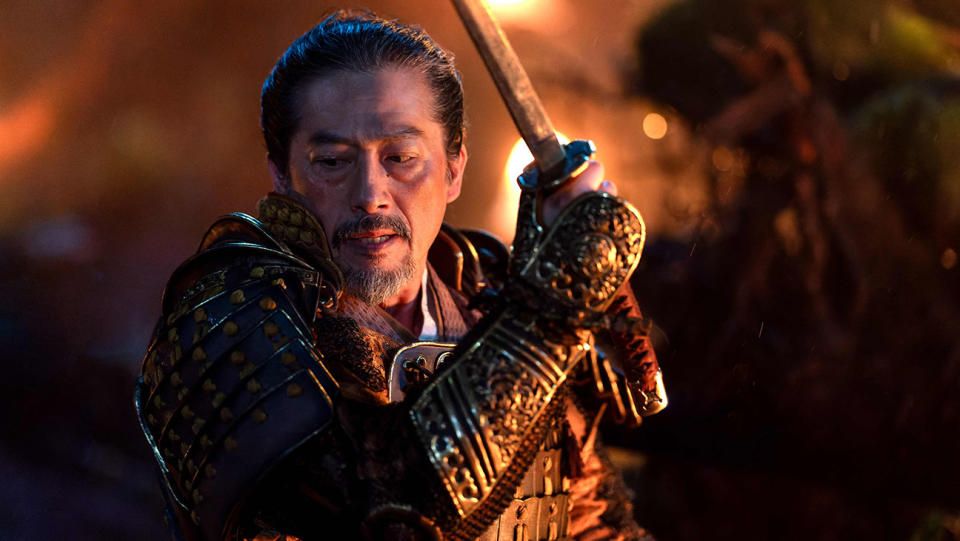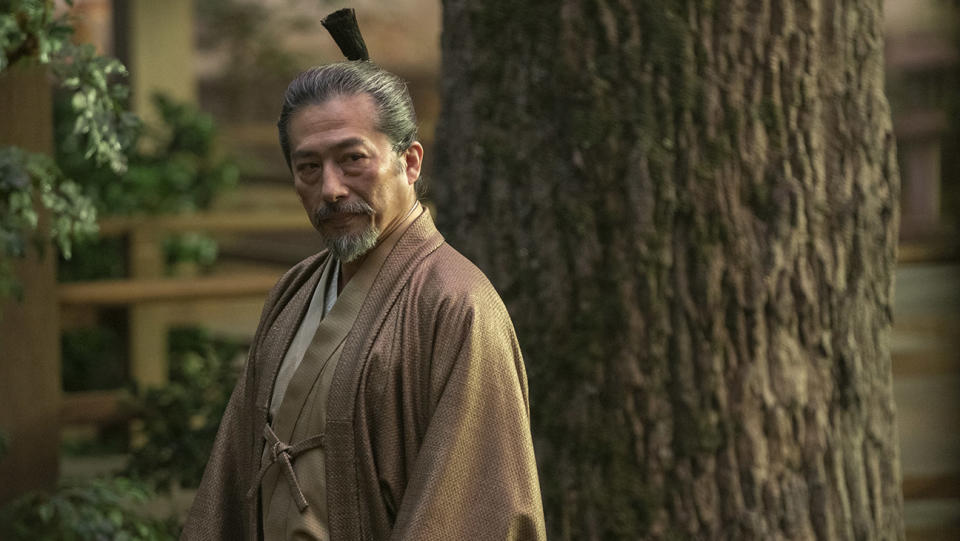‘Shogun’ Star Hiroyuki Sanada Delves Into Finale’s Deeper Message: “We Need the Hero Who Brings About Peace”

[This story contains major spoilers from the season finale of FX’s Shōgun.]
It’s easy to picture Japanese actor Hiroyuki Sanada gazing toward the horizon with a beatific sense of satisfaction over everything he has achieved with FX’s smash-hit miniseries Shōgun. His character, Lord Yoshii Toranaga, enjoys several such moments in the show’s 10th and last episode, A Dream of a Dream, as his patient, masterful strategizing finally yields precisely the outcome he desires: absolute power for himself and peace for all of Japan.
More from The Hollywood Reporter
Sanada’s moment of career triumph is not dissimilar in its decade-spanning tirelessness (at least, in entertainment industry terms). He began performing nearly 60 years ago as a child in Japan, apprenticing under the legendary actor Sonny Chiba on the way to becoming a major local star, before breaking into Hollywood with roles in projects like The Last Samurai, Lost, The Wolverine, Avengers: Endgame, Bullet Train, John Wick: Chapter 4 and many others.
But now, he is the star of what many analysts believe to be Disney’s most-watched streaming series to date, a show that also happens to be the first project to bear his personal imprint as a producer. For Shōgun, Sanada fulfilled a long-held dream of bridging his two careers in Japan and the U.S. by taking the helm of a period samurai story that is executed with both Hollywood production firepower and an uncommonly high degree of cultural accuracy and respect.
“Western and Japanese cast and crew working together across cultures to achieve the same goal — to tell this great old story in an authentic way,” Sanada says. “That we were able to make this happen is like a miracle to me.”
Like the hit show’s co-creators, Sanada has nothing new or definitive to share about whether the show might find a way to extend beyond FX’s original plans for a single-season run (“We’ve been talking about how the story can continue since we started shooting, but who knows”). But below, he shares how he hopes Shōgun will be remembered if we’ve indeed seen the last of Lord Toranaga on screen.
***
As the curtain comes down on Shōgun, we’re given a glimpse of Lord Toranaga’s vision of the future. It appears all but certain that he has out-foxed everyone and won the grand game. But it has cost him his eldest son, his oldest friend and his loyal translator and confidant, Lady Mariko. How do you view the ending for him?
I think it’s kind of a happy ending. There are some sad notes, but the ending reveals Toranaga’s dream — what he’s been wanting this whole time and what he will create for the future of Japan. If people know the history, they already know what Toranaga creates. And that was the most important thing for me about this story: Toranaga ended [the Warring States period] and created a peaceful era in Japan that lasted for about 260 years, until the country opened to the world. That’s Toranaga’s vision. That’s what he’s been struggling for and that’s what his never-give-up mindset has achieved.
Even after he went to the very bottom of his life — around episodes seven and eight — he never gave up. He also had a lot of good luck. And it’s allowed him to change the course of history. Creating this period of peace will be the greatest thing he’s ever done. That’s why the model of Toranaga, [Tokugawa] Ieyasu, is such a hero in Japan.
Since I was a kid, I’ve been reading novels about him, watching movies and TV series about him. I even played Ieyasu once before (in the 1989 Japanese historical drama Oda Nobunaga). The reason I took the role this time is because I believe we need this kind of hero right now. We need the hero who brings about peace. That’s a very good message for the world — especially now when human beings around the world are fighting each other again. Shōgun shows how hard peace can be to achieve.
In that wonderful final scene between you and Tadanobu Asano as Yabushige, the question arises of whether it was Toranaga’s goal all along to achieve total power and become Shōgun, or if he was forced by circumstance to pursue that role. What’s your take?
Well, we were very careful never to say clearly if he always wanted it or not. As soon as around episode four, he says he’s not interested in becoming Shōgun — but he says many things for strategic reasons and his real intention is sometimes mysterious. If you ask me, I think that statement is true in this version of the story. Toranaga didn’t specifically seek that position but finally, he needs the title of Shōgun to make his dream of peace come true.
I felt myself relating to this because it kind of overlapped with my position on this production. You know, on all of the movies and TV shows I worked on before, I never wanted or asked for the title of producer. But on this project, I started to feel the limit of what I can say and do behind the scenes as an actor. You know, sometimes I had a strong view on how we should handle something, but I would have some hesitation to say it and I wouldn’t want to hurt other actors’ or crew members’ pride. Finally, though, they asked me to be a full producer this time. Right away, I felt a big difference between having this title and not having it. I could share my views right away. Everyone would listen, and the production would move forward. Having this title allowed me to help make a much better show. So maybe it was the same for Toranaga. He didn’t really want it. But at some point, he realized the only way to create a peaceful era was to become Shōgun himself.

After this exceedingly positive and successful experience, do you plan to continue as a producer on the future projects you’re involved in?
Yeah, I would love to. Being able to shape the creation from zero is so much fun. But, you know, there are a lot of ways to tell stories involving Japan. If it’s more modern or futuristic, it’s may not be necessary to be this authentic. I was in Bullet Train and John Wick and I didn’t say too much, because those projects are set in their own worlds. It’s not the real Tokyo or the real Osaka. But for this series, where we were doing historical Japan, we needed to make it authentic. If I’m involved in a project like this again, I’m probably going to want to be a producer, and I’m going to push very hard again to get it right. But if it’s not a story that’s supposed to be carrying our culture, I’m happy to just enjoy being an actor on set. So, it’s going to be case by case.
You mentioned how Ieyasu is a figure of such supreme historical grandeur in Japan. As you were inhabiting Toranaga across this whole season of Shōgun, what was important to you in how you shaped your portrayal of him?
I tried to forget the model and many great actors who played Ieyasu before. You know, Toshiro Mifune played him and he’s one of my favorite actors of all time. So at the beginning, I thought, “okay, I have to forget everything — all of this great work done by my ancestors.” So my Ieyasu, or Toranaga, he’s a great strategist and he’s powerful, but he’s also a human being. Sometimes he shows weakness and he’s a family man. I suppose humanity was the most important thing for me. He’s not just mysterious and powerful. Sometimes he’s a weak old man. He’s complicated and like all human beings, he has many different faces. I didn’t want him to be the stereotypical strong samurai.
Some of your co-stars have mentioned how Shōgun was shot chronologically and how that benefited them in deepening their connection with their characters as the show progressed. Was that helpful to you, too? Had you discovered more of him by the finale?
Well, again, I knew this history so well and we had spent five or six years in preproduction before shooting, so the character was very clear in my mind. But with the other actors, it was very helpful to get to know them little by little, and for our connections to get deeper over time. Especially with Anjin, or Blackthorne. Cosmo [Jarvis] and I both believed that we shouldn’t really talk much between shooting. We thought we should build our chemistry little by little, in an organic way. So, we would enjoy our shooting sessions on set, but then no other chatting or joking around at all. So, little by little, we got to know each other and started to respect each other, but it all happened naturally in front of the camera. I think that helped the show a lot. You can feel how that relationship has evolved by the end.
When I spoke with Anna Sawai (who plays Lady Mariko) she mentioned how much you helped her both on and off-set. It almost sounds like the opposite from your approach with Cosmo, but I guess that’s fitting since the relationship between Mariko and Toranaga is very different. They have a history together and their bond is already quite deep.
Yeah, you know, this was her first samurai drama, so we ended up spending a lot of time together. She was always asking me about the dialogue, the traditional movements, the fighting style — everything. So I was always trying to support her — on set or by doing weekend Zoom sessions to work on dialogue. I was there for her and we did develop a deeper connection — it felt like she was my daughter or a partner of some kind. And like with Toranaga and Mariko, little by little, we were finding out what she was capable of and how best we could use her talents — which culminated in episode nine. I think that the audience can feel that very different bond and chemistry we had together.

You’ve played many diverse characters over your long career, but samurai films and series have been a constant. How do you feel when you have a new samurai project coming up? Is the makeup and costume process cumbersome, or is it nice to know that you’ll be wearing swords to work again soon?
(Laughs) The kimono and the sword are so familiar to me. I’ve worn the kimono for half of my career. Even the armor feels comfortable. It’s like slipping into pajamas for me. And the dialogue as well. Jidaigeki Japanese is like our version of Shakespearean English. It’s totally different and can be very challenging for young actors. But I started acting when I was 5; I’ve done so many samurai films over the years. It feels kind of like I grew up bilingual, speaking both ancient Japanese and modern Japanese. So I’m very comfortable. With this project, because I was also working as a producer and had brought my whole team from Japan — samurai specialists and experienced Japanese crew for each department — when it came time to step in front of the camera, I felt totally confident and relaxed. Performing felt like my reward for working so hard as a producer. I could just relax and be there as my character.
One of my favorites of your many samurai films is Yoji Yamada’s Twilight Samurai. In that film, you play the opposite sort of samurai from Lord Toranaga.
(Laughs) Yes, a poor, simple family man. No big dream, no glory.
Exactly. That film, like some of the other great samurai movies of the past — Kobayashi’s Harakiri (1962) is another favorite — gets its power from being almost an anti-samurai movie, or a critique of the samurai ideology. Having starred in so many of these stories, what are your thoughts on the Bushidō code from a present-day point of view?
Well, there is an awful lot of violence in it, and rules that seem strange and extreme to us today. But all of those rules and values have their history and reasons — even loyalty that requires great sacrifice. But from bushidō, I believe we can also learn how to avoid the fight. Part of what bushidō and other martial arts teach us is that we should be hard on ourselves so that we can be kind to others — that our sacrifices should go towards building a more peaceful world. That’s Shōgun‘s message, too. I hope people can feel that from the story and apply it to their real lives in some way.

Shōgun is now streaming on Hulu.
Best of The Hollywood Reporter
